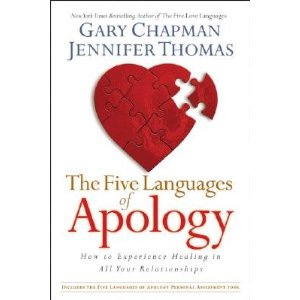5 Ways to Apologize…Believably!
Do you believe people when they apologize to you?
What’s to believe you ask? How about the apology that comes with a ‘but’ or an ‘if you hadn’t done that’, etc.?
Understanding your apology language
There’s a simple way to understand what ‘your apology language’ is.
What? Now they have apology language? I know this sounds strange, but I read the book and looked into what my ‘apology language’ was by taking their test to ‘locate mine’. The test opened my eyes to the fact that I need my husband to express regret and acknowledge that he did something wrong.
The 5 languages of Apology by Drs. Gary Chapman and Jennifer Thomas list those languages as:
- Expressing Regret “I am sorry.”
- Accepting Responsiblility “I was wrong.”
- Making Restitution “What can I do to make it right?”
- Genuinely Repenting “I’ll try not to do that again”
- Requesting Forgiveness “Will you please forgive me”
Why bother with learning ‘just one more thing’
When you find out how you are ‘willing’ to receive an apology, then you’ll understand that the way you’re apologizing to people is the way you want to receive an apology. It makes sense when you understand that everyone is different and has their own way of wanting to be apologized to. In your marriage you’ll see why you just don’t feel like your spouse is really ‘sorry’ or has ‘assured you it won’t happen again’. I’m sure you could give me a lot of reasons their apology sounds, fake, phony, insincere or a way to blow you off in that situation. Now that you see there are different ways to apologize, you may want to take the 30 second test to see what you expect in a given apology. The test in the book is longer and more thought provoking plus I also thought I needed to put in more than one answer on a question.
Discovering the 5 languages of apology is just the beginning. You can see it’s different for everyone which means you need to find out your spouses accepted way of being apologized to along with your children. Then you’ll begin to see that you can put in all five apologies with each person until you discover their main means of accepting how you’re apologizing. It’s not about ‘just the right performance’ to give an apology. Rather it’s about caring enough to make sure your apology hits the mark in another’s life.
We’re all raised with specifics on apologizing
Some people grow up with saying, “I’m sorry” and believing that should be enough. Others feel it’s a sign of weakness to apologize and ‘if they love you, you don’t need to say I’m sorry’. (Wasn’t that an old song?)
After trying out this with my husband, he is ‘hitting the mark’ every time now in his apology. Yes, I’d forgive him before, but believe it or not…now it seems like he ‘really means it’ and is ‘really sorry…seeing that he did something offensive to me’.
Does it sound like I’m a spoiled brat that insists on him doing something only my way? He said he’s glad he found out how to apologize and get it across to me. He must have sensed that I as resistant to his way of apologizing previously and that frustrated him. A little good information can go a long way.
What am I doing on my end about apologizing to him? Everything I can to ‘hit the mark’ so he knows I truly am sorry and don’t want to hurt or disrespect him. Trust me, the book was worth the $8.98 plus shipping (Amazon) in oh so many ways!
What’s the best or the worst apology you’ve ever heard? Love to hear any comments for all of us!








To me, the worst thing a person can do when apologizing is to follow it up by immediately saying, “but…” There is almost nothing that can be said next that won’t come across as meaning, “but I was totally justified,” or, “but it was really your fault.” When I am apologizing, especially if I do feel defensive about what I did, I try to force myself to say, “I’m sorry.” and STOP THERE at least for a few seconds. That leaves room for the other person to accept the apology. If he doesn’t say anything, I work out (this can be difficult) a sentence showing that I see his hurt feelings or other damage I’ve done. Pause again. THEN I check if I still feel like defensively explaining. Sometimes I don’t!
‘Becca recently posted..Simple Solution to Six-year-old’s Sleep Situation coming into parents’ bed
‘Becca,
I can see that you’re someone who is very perceptive. Even taking the time to pause and listen, then respond again to make sure the person understands your remorse is more than the average joe does in an apology.
I agree that it’s hard to apologize when you feel defensive. Guess the way I’m seeing it is; what is the end result I want. Then I’ll approach the situation with that goal in mind.
The premise of the book is to find a way to apologize for each person that is well received because we all have a way we receive an apology. Since being ‘perceptive’ is really difficult for some people, a way to apologize would be to try and hit all the 5 ways to apologize. It almost sounds funny, but you’re sure to hit upon at least one or two that get your apology over to someone. And that is the goal I have in mind when apologizing.
Thanks for your comment. It was thoughtful and well put.
Groovy. Is this put out by the same publisher/writers as the FIVE LOVE LANGUAGES book? Thank you so much for sharing. I’m interested in reading this one and the FIVE LOVE LANGUAGES (again). 🙂
Best wishes.
Same people, Brook. This one is a faster read too. You’ll really ‘get it’ better if you read the book.
Love it! I hate the “buts” in apologies and, like you, need to hear the other person admit wrongdoing. I’ve made it a point to not answer “that’s ok” when someone apologizes. They are apologizing because something was NOT ok. I’ll respond with “I forgive you” or “thank you for apologizing” or something like that. I don’t remember where I heard to respond that way, but it makes total sense!
Audra recently posted..Rapture Is THIS the hour
Audra,
That is so right in the ‘forgiving’ end of apologizing. I like both ‘I forgive you AND thank you for apologizing’. That ‘feels’ good just thinking about someone saying that to me after I apologize. I’ve been left hanging before when the person didn’t even acknowledge that I did apologize.
People usually do respond with ‘that’s okay’. If it was okay, then why did the other person need to apologize! I hope people take the time to read the comments here. This posting has definitely continued in them!
Thanks, Audra for filling in the ‘left out part’ of apology accepting.